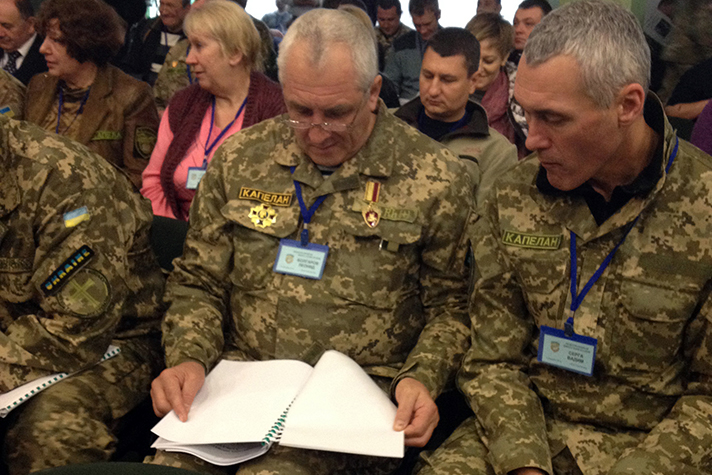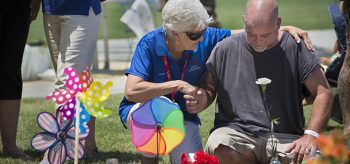
In December 2015, Billy Graham Rapid Response Team chaplains from the United States and Canada put aside politics and gratefully accepted the invitation to minister to the evangelical chaplains in Ukraine, a country besieged by war and civil unrest. The goal of the four-day training was to spiritually refill and equip these chaplains who tirelessly share the love of Christ wherever they go.
The door opened abruptly. Ukrainian presidential spokesman Colonel Andriy Lysenko, flanked by military officials, sternly entered the Ukrainian Evangelical Theological Seminary. Silence washed over the room.
The Colonel’s visit to the Kiev-based facility wasn’t on the agenda of the chaplain training led by members of the Billy Graham Rapid Response Team. Immediately, everybody stood and waited to hear what Lysenko had to say.
“He came to let the evangelical chaplains know that when he’s on the front lines, he notices there’s something different about them – they’re friendlier and talk on the same level of those they’re serving,” said Jeff Naber, manager of chaplain development and ministry relations for the Billy Graham Rapid Response Team (RRT).
“The reason he came was he heard about this meeting, and he wanted to let them know he appreciates them serving.”
Praise from the country’s executive level was a real boost for the chaplains who are stretched thin. Right now 300 of them attempt to minister to the country’s 45 million populace. If you break it down, that would be like assigning one chaplain to a city roughly the population of Syracuse, New York, but with almost 30 times more square mileage.
It’s a tall task for these road-weary chaplains in the ongoing presence of violence. Alcoholism and suicide run rampant. Post-traumatic stress disorder (PTSD) is prevalent in the country where thousands have died since the beginning of the conflict between Russia and Ukraine.
PTSD also affects the evangelical chaplains, who reached out to the Canadian-based international relief organization HART (Humanitarian Aid Response Teams) for help. HART contacted the Canadian Billy Graham Rapid Response Team office, which looped in their American counterparts. The RRT, which simply saw the opportunity to share God’s love, put aside politics and gratefully accepted the invitation to minister to their fellow chaplains serving Christ.
One hundred fifty evangelical chaplains attended the four-day seminar, which focused on PTSD. Chaplains David and Suzanne Mikkelson, resident North Carolinians with doctorate degrees in PTSD counseling, led classes along with Naber and Merle Doherty, manager of the Canadian RRT. Many topics were addressed including a review of trauma and resiliency, stress symptoms and coping skills, Biblical theology of suffering, spiritual and moral injury, hypervigilance and preventive actions.
Pastor Valeriy Trufanov, a retired colonel in the Ukrainian army and current leader of the recently formed Association of Professional Chaplains Ukraine, attended the training. He told Naber about his God-sized dream for Ukraine, which lacks a functional mental health care structure.
“Valeriy tells me, ‘If I can get one chaplain out of each of the 14,000 churches in Ukraine, we could provide these (mental health) services,’” Naber said.
Ultimately, Trufanov told Naber through a translator, he wants to plug his evangelical chaplains into a system similar to what BGEA employs with its Rapid Response Team. Instead of ministering to one specific area, say the military for instance, Trufanov’s chaplains would branch out to cover every facet of the community in the sixth-largest European country.
“That’s God bringing us together,” Naber said. “He’s seeing what we’re already doing and wants to use that same model.”
The Ukrainian chaplains minister to hurting people where they are, so that means they could be serving unarmed in the middle of a firefight or they could be comforting a mother mourning the loss of her son. The chaplains pray tirelessly with and for people who are just trying to survive in a country where almost a third of the population lives below the poverty line.
Naber said the Ukrainian evangelical chaplains realize God is calling them even louder to help their fellow countrymen and women find peace in the midst of tumultuous times.
“Some of (the chaplains) are traveling great distances—from the west side to the east side where the battlefront is—and they do it just on faith, knowing that when they answer this call, their provisions will be met,” Naber said.
“And many of them for a month at a time leave their families and travel to these areas that are very dangerous, knowing that the people who are there, the Ukrainians that are there are in great need of hope. The chaplains know just from their own life experiences that the true hope only comes from Christ.”


